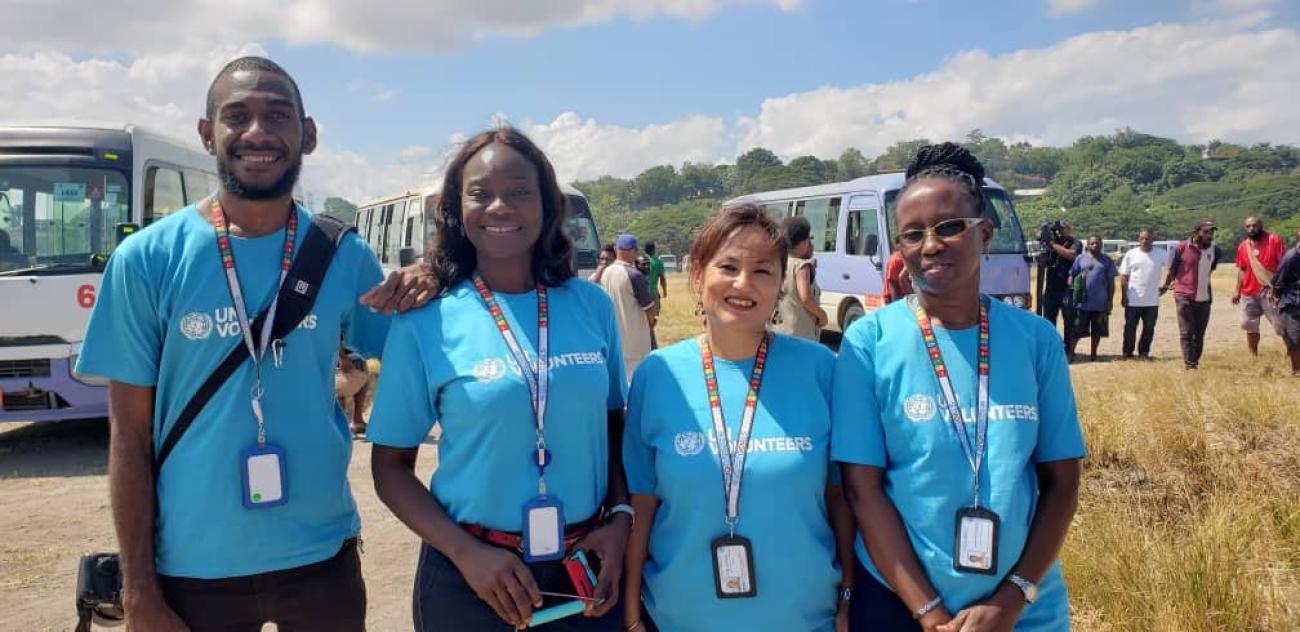UN Volunteers Assisting COVID-19 Response in PNG

UN Volunteers supporting five UN agencies are supporting government and partners in developing an informed, targeted COVID-19 response.
UN Volunteers across the world have contributed directly and indirectly to the national response, supporting persons in need and strengthening business’ capacity to operate effectively under State of Emergency regulations. In Papua New Guinea (PNG) too, UN Volunteers are assisting the United Nations to provide a coordinated and inclusive COVID-19 response. This is how UN Volunteers serving with four UN agencies are supporting government and partners in developing an informed, targeted COVID-19 response.
In Port Moresby, UN Women has supported the National Capital District in providing hygiene resources for and conducting research to support local market vendors. Jacinta Nakachwa from Uganda, Mojisola Akinsanya from Nigeria, Sita Gurung from Nepal, Goodshow Bote from Zimbabwe, and Christopher Kageni from PNG are working with UN Women as the agency conducts needs assessments in markets across Port Moresby. These market rapid assessment focus on COVID-19 knowledge levels, myth and misconceptions, responsiveness and preparedness of market management and impact of COVID-19 on social and economic status of market vendors.
“The findings have proven that there is still a lot of awareness effort needed,” Jacinta shared. “Because PNG has not had very many cases of Covid 19 like in the neighbouring countries, there are a lot of myths and complacency among the people that have to be broken just in time before the worst comes.” To combat complacency, Jacinta has drawn from her experiences in Uganda. “Innovative ideas and experiences are shared,” Jacinta said. “For instance, in terms of awareness creation, Uganda has in the past successfully battled the Ebola virus. Drawing from that experience, it is comforting to sensitise others that if all WHO and health guidelines are followed, the pandemic can be overcome.”
Additionally, UN Women has kept the public updated on which domestic violence services remain open during the State of Emergency and has developed materials to support women who may be experiencing violence while local services are unavailable.
In Bougainville, UNDP is conducting further assessment on the socio-economic impacts of COVID-19 and the State of Emergency is being conducted by UNDP. UN Volunteer Theresa Baranangko from PNG is collecting survey responses for this assessment in Bougainville. The purpose of the assessment is to inform the Government, Development Partners, and Private Sector, so that they can focus their response instruments, policies and programmes on the most vulnerable and disadvantaged segments of society to help minimize the social and economic fall out of the COVID-19 pandemic. Based on the assessment, specific and targeted strategic interventions can be designed accompanying the Government’s Economic Stimulus Package to support a quick rebound and recovery.
Meanwhile, with UNCDF, UN Volunteer Eric Sena from Ghana, is supporting Women's MicroBank, Nationwide MicroBank and Life Insurance Corporation Limited (LICL) to digitize processes that would otherwise require face-to-face interactions, limiting opportunities for exposure. LICL customers will soon be able to submit membership applications and claims forms online and make payments via mobile and internet banking.
In Port Moresby, UN Volunteers attended the opening of the city’s COVID-19 testing and isolation centre. They were shown a simulation of how health workers are prepared to manage a potential increase in cases. This facility, which has been developed with insights from WHO and logistical support from UNDP, IOM, UNICEF, WFP and the Resident Coordinator’s Office (RCO), is now operational and open for testing of residents who have been referred by the national COVID-19 hotline.
Australian Rachel Donovan has been working with other UN personnel from WHO, UNDP, UNICEF and the RCO at the National Operations Centre, supporting communications activities. In addition, she visited the provincial COVID-19 taskforce in Kiunga, Western Province, as the UN announced new funding to support the provincial administration in addressing secondary impacts of COVID including maternal health, nutrition, and water and sanitation.
“Visiting the communities most at risk of COVID and its secondary impacts helps us to understand the information needed on the ground and the gaps in knowledge and services that we need to address,” Rachel said. “It has been incredible to see how much we all need to collaborate with other agencies, government, churches and community groups to do our work effectively. The UNV community here in Port Moresby makes that essential collaboration possible.”
Communications activities on COVID-19 are evolving to respond to the needs of vulnerable communities and to the specific concerns of provinces. UNAIDS, with the assistance of UN Volunteer Abigail Brown, has conducted surveys among persons living with HIV/AIDS and persons with TB. This survey enables UNAIDS and partners assess the needs of persons living with HIV/AIDS and persons with TB to ensure they are able to safely access medication and healthcare services and to advocate for improved training and messaging for service providers.
Critical to responding to the concerns of survey participants is the need to reduce stigma through responsible reporting on COVID by national media. To mark World Press Freedom Day (3 May), the RCO’s Office organised a dialogue between the government and news media editors to strengthen public interest reporting during the COVID-19 emergency. This dialogue brings together the work of UN Volunteers from UNAIDS and the RCO and is a model for conducting productive, engaging discussions while adhering to physical distancing rules during the COVID pandemic.
UN Volunteers in Papua New Guinea continues to collaborate with their host agencies and the wider UN family to deliver a coordinated COVID-19 response for all. “Since the World might have to live with the pandemic for an unknown period,” said Jacinta, “every effort counts to ensure that a new “normal” way of life is adopted and practiced by the general population.”




